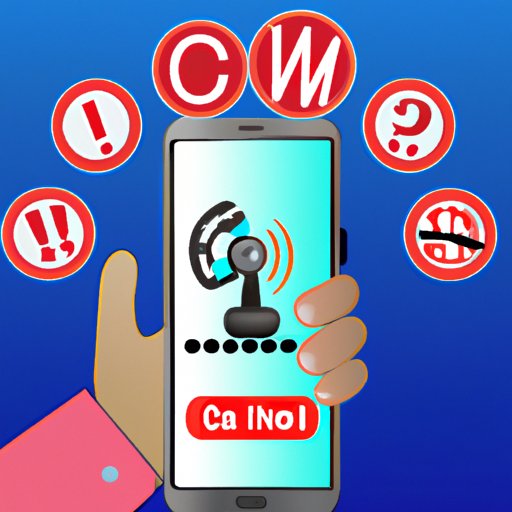
Introduction
Most of us have likely received a scam call at some point in our lives. These calls can be frustrating, uncomfortable, and even dangerous, as scammers may attempt to steal personal information or access our bank accounts. But there are steps you can take to protect yourself against these scams.
In this article, we’ll explore the different types of scam calls, provide an overview of the available tools to block these calls, delve into the psychology behind these scams, and offer some do’s and don’ts for dealing with them. We’ll also touch on the legal and regulatory environment surrounding scams, and what you can do if you fall prey to one.
Providing an overview of scam calls
Scam calls can come in various forms, and they can be difficult to identify. One common type is the robocall, where an automated message plays when you answer the phone. Other scams may be more elaborate, disguising themselves as calls from government agencies, banks, or other reputable organizations. Phishing scams, where scammers try to get you to reveal personal information through clever social engineering techniques, are also prevalent.
To protect yourself against these scam calls, be wary of calls from unknown numbers. If you do receive a call from an unfamiliar number, don’t engage with the caller. Instead, hang up immediately. Also, you may want to report the call, either to your phone carrier or the Federal Trade Commission’s (FTC) Complaint Assistant tool.
Step-by-step guide to blocking scam calls on your smartphone
One of the most effective ways to protect yourself against scam calls is to use apps or tools designed to block them. Some smartphones come with built-in features that allow you to automatically block calls from unknown or suspicious numbers. Here’s a step-by-step guide on how to use these tools effectively:
- On an iPhone, go to Settings, then Phone, then Call Blocking & Identification. From here, you can add numbers to your block list. On an Android device, go to Phone, then Settings, and then Call Blocking. Again, you’ll have the option to add numbers to your block list.
- Consider downloading additional apps like Truecaller, RoboKiller, or Nomorobo. These apps use databases of known scam numbers and community reporting to block unwanted calls.
- Make sure to keep your phone’s software up to date. Updates may include improvements to existing anti-scam features.
While these tools can be effective, they may not catch every scam call. It’s also important to remember that some scammers use “spoofing” techniques to make it appear that their call is coming from a legitimate number. In these cases, your phone may not recognize the call as a scam and allow it to go through.
The psychology of scams
Scam artists are experts at manipulating people. They often use tactics like creating a false sense of urgency, using social proof, or even just being friendly and persuasive to get their targets to take the bait.
But why do some people fall victim to these tactics while others do not? Factors like age, culture, and even personality traits can play a role. Young people, for example, may be more likely to fall for unfamiliar scams, while older people may be more susceptible to scams that involve medical or financial issues.
To protect yourself against scammers, be skeptical of unsolicited phone calls, especially those that ask for personal information. If you receive a call like this, don’t engage with the caller. Instead, hang up and report the call to authorities.
Do’s and don’ts for dealing with scam calls
Knowing what to do (and not do) when you receive a scam call can help protect you against these types of scams.
Do:
- Hang up immediately if you suspect a call is a scam.
- Report the call to your phone carrier or the FTC’s Complaint Assistant.
- Be skeptical of unsolicited phone calls, especially those that ask for personal information.
Don’t:
- Engage with the scammer. Any interaction can encourage them to call again or target you in other ways.
- Provide personal financial information over the phone. Legitimate companies will not ask for this information over the phone.
- Click on links or download files sent by unknown numbers. These may contain malware or other harmful software.
Legal and regulatory environment
The government has taken steps to address scam calls, and there are laws in place to punish perpetrators. The FTC, for example, has set up a Do Not Call Registry that prohibits telemarketing calls to registered numbers. If a telemarketer violates this rule, they may face fines of up to $43,280 per call.
However, law enforcement faces challenges in catching and prosecuting scammers, many of whom operate outside the United States and cannot be easily tracked down. If you fall victim to a scam call, there are steps you can take to report the incident and try to recover any lost money. You may want to consider contacting the FTC, the FBI’s Internet Crime Complaint Center, or your local law enforcement agency.
Conclusion
Scam calls are unfortunately a part of modern life, but there are steps you can take to protect yourself against them. By using available tools to block unwanted calls, being skeptical of unsolicited phone calls, and following do’s and don’ts for dealing with scam calls, you can reduce the likelihood of falling prey to these scams. While stopping all scam calls may not be possible, being proactive and informed can help you stay safe and secure.





